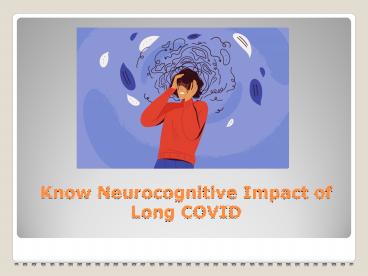Know Neurocognitive Impact of Long COVID | Post Covid Centers - PowerPoint PPT Presentation
Title:
Know Neurocognitive Impact of Long COVID | Post Covid Centers
Description:
What is the Neurocognitive Impact of Long COVID? It leads to brain fog and neurocognitive impacts. To know more about it call (469) 545-9983 to book an appointment. – PowerPoint PPT presentation
Number of Views:20
Title: Know Neurocognitive Impact of Long COVID | Post Covid Centers
1
Know Neurocognitive Impact of Long COVID
2
COVID and Brain Fog
Source https//postcovidcenters.com/blog/neuroco
gnitive-impact-of-long-covid/
3
The neurocognitive impact of long COVID
Long COVID is associated with serious
neurological and neurocognitive impairments for
many people. This phenomenon is also referred to
as neuro-COVID. many people. This phenomenon is
also referred to as neuro-COVID. Long haulers
suffering from Neuro-COVID, or long-neuro-COVID,
experience the lasting neurological symptoms
after acute infection with SARS-CoV-2. The most
common symptom of neuro COVID is brain fog, which
is the inability to think clearly. COVID-19
damages the brain in various ways. Some of these
can be devastating, including encephalitis,
strokes, and lack of oxygen to the brain.
Whereas, other effects are more subtle, like
persistent impairment. Along with direct effects
on the brain, COVID-19 has long-term effects on
other organ systems as well. The long haulers
have lasting symptoms including fatigue, body
aches, unable to exercise, headache, and
difficulty sleeping. These problems may result
from permanent damage to your lungs, heart,
kidneys, or other organs. Damage caused to the
organs or the symptoms alone can impair thinking
and memory and cause brain fog.
4
Long COVID Brain Fog PASC (post-acute sequelae
of COVID-19 infection), Long COVID, or post-COVID
syndrome involve physical and/or cognitive
symptoms at least 6-12 weeks after having a
positive test for COVID-19 or symptoms of acute
COVID-19 infection. People suffer from
neuro-COVID after COVID infection experiencing
the acute manifestations of COVID-19 in the
brain. These symptoms include headache and loss
of smell along with some of the rarer problems,
such as stroke, encephalopathy, and
Guillain-Barré syndrome. Neuro-COVID in
long-haulers causes lasting neurological symptoms
after acute infection with SARS-CoV-2. People
with neuro COVID usually complain of brain fog
that is the inability to think as clearly as
usual. Brain fog is the problem with thinking,
memory, and concentration, but for some people,
it can be challenging to describe.
5
- Brain fog after COVID could be caused by various
reasons, including - Lack of oxygen causes lung damage.
- Inflammation damages the brain cells.
- An autoimmune disorder triggers the immune system
to attack healthy cells in the body. - Lack of blood flow results in swelling of the
small blood vessels in the brain. - Invasion of infectious cells into the brain.
- Inflammation in and around your brain would
contribute to brain fog. But, other indirect ways
are leading to brain fog after COVID-19
infection. Various factors are contributing to
brain fog development, which includes - Poor sleep quality
- Feelings of loneliness
- Depression
- Increased stress or anxiety
- Dietary changes
- Decreased physical activity
- Side effects of some medications
6
- Symptoms of Brain Fog Caused from COVID-19Time
- Duration of how long brain fog would last after
COVID-19 is still unclear. Some people encounter
brain fog symptoms for weeks or months after the
respiratory symptoms have cleared. Symptoms of
brain fog may also appear as - Walking into a room and forgetting the reason to
be there. - Losing your thoughts.
- Difficulty finding the right words.
- Difficulty remembering anything you just read.
- Taking a long time to complete tasks.
- Forgetting things while cooking.
- Leaving lights or appliances on unintentionally.
- Forgetting things after becoming distracted.
- These symptoms emerge after patients recover from
the medical emergency and go back to work.
Sometimes, patients even have trouble functioning
on the job or managing daily responsibilities
that negatively impact their quality of life. - Continue to Read More Click Here



























![Covid-19 Impact on Global [3-(Dimethylamino)propyl]triphenylphosphonium bromide hydrobromide CAS 27710-82-3, Applications and Countries Forecast to 2026 PowerPoint PPT Presentation](https://s3.amazonaws.com/images.powershow.com/9690543.th0.jpg?_=20211130028)



